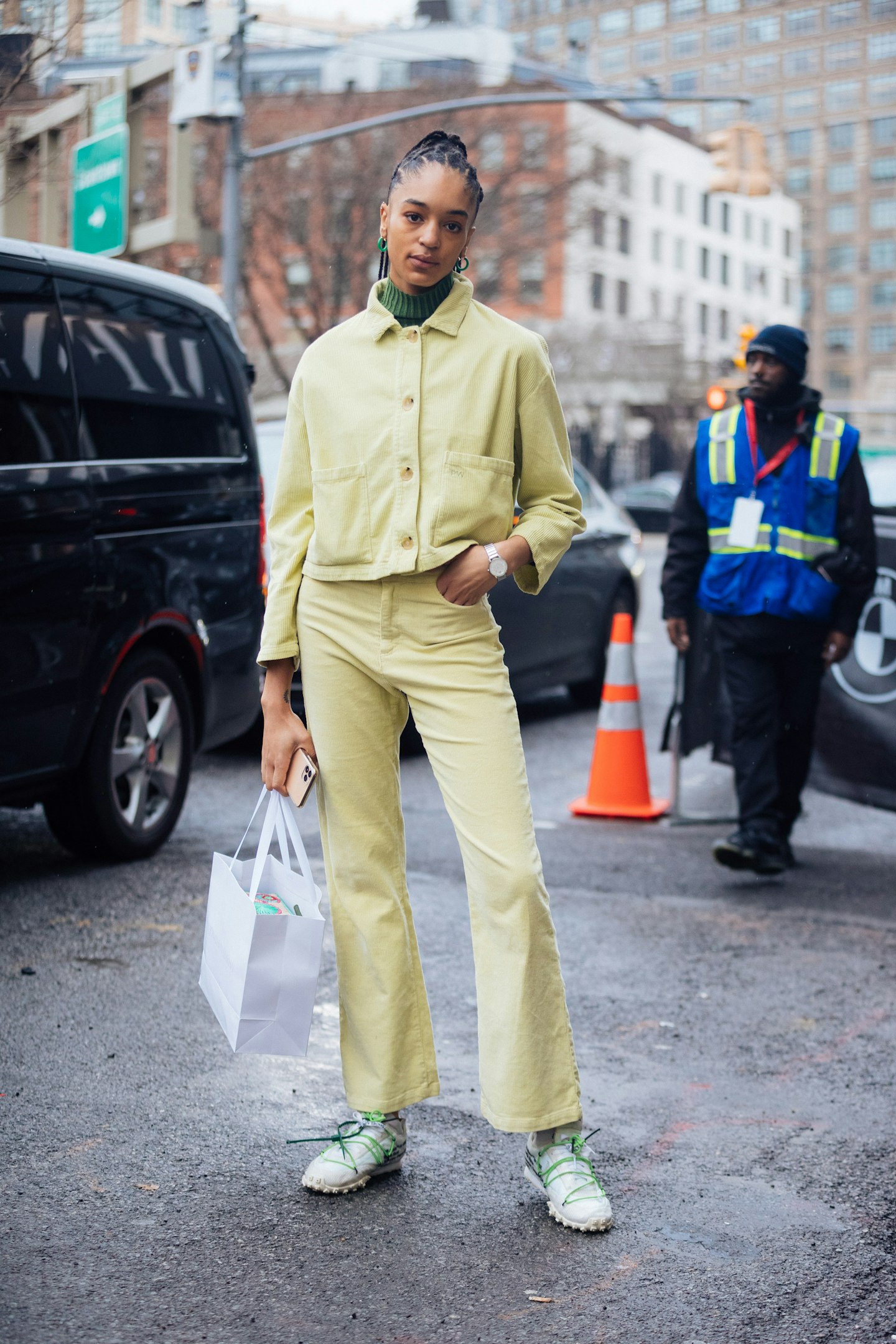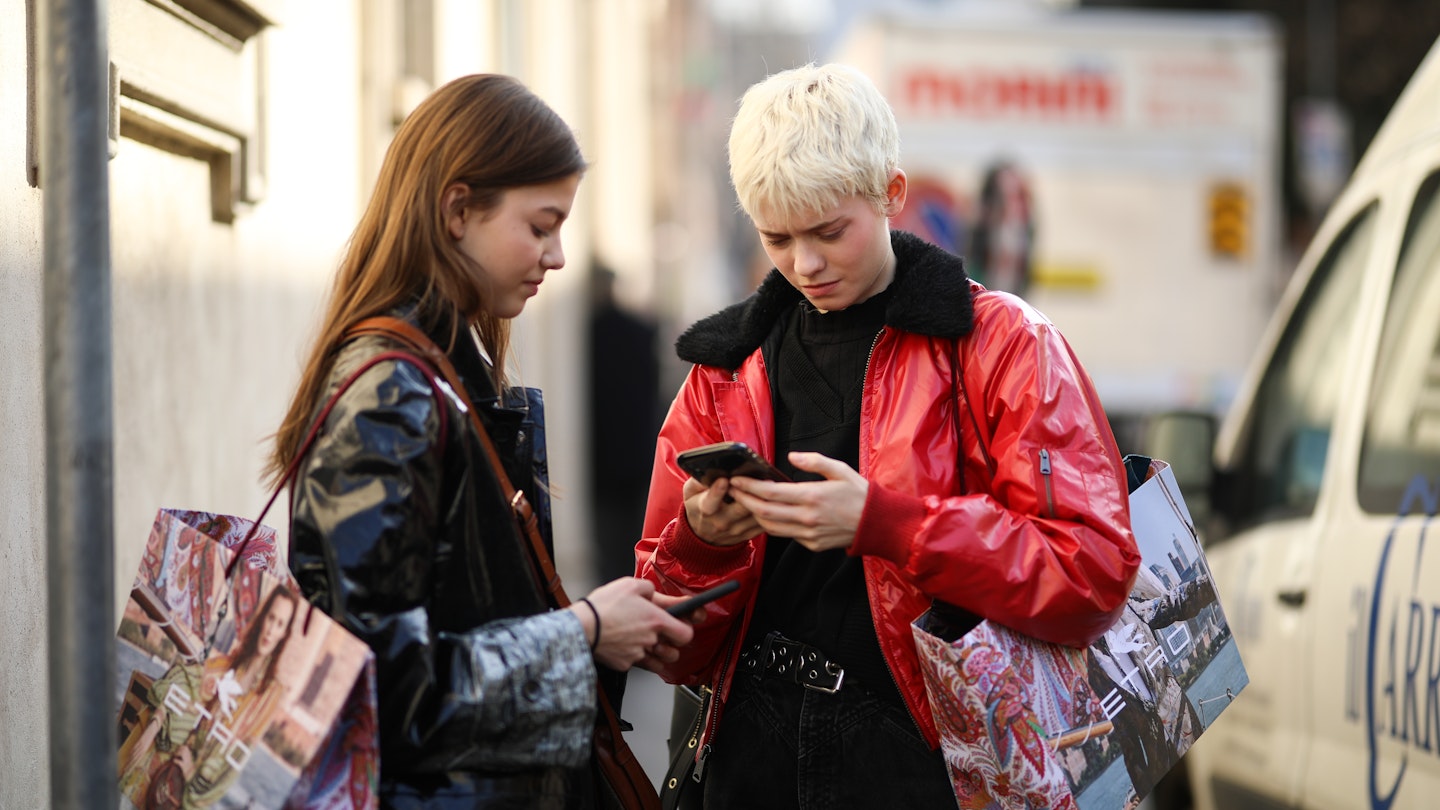Far be it for us to deny anyone an action that results in joy for them right now. But there's a debate raging; to shop or not to shop. On the one hand, shopping is a way to support businesses perilously close to folding thanks to the economic impact of the lockdown; on the other it has the potential to put suppliers and delivery drivers at risk. So what do you think - should we be shopping or not? We argue each side of the argument - and flag up what you should you be considering when making your decision.
'Yes', says Laura Antonia Jordan, fashion news and features director
To shop or not to shop, that is the question (or, you know, a question). The Covid-19 crisis has realigned our priorities and outlook. What felt important just weeks ago now feels irrelevant; what was taken for granted (seeing friends, buying takeaway coffee, popping to the shops) is now a luxury. And given this new reality, a debate is raging about whether shopping for fashion and anything deemed non-essential is necessary or morally repugnant. Social media is divided, and you probably are too.
Reasons to be cheerful are sorely lacking right now. Even if you are able to tune out the apocalyptic noise and the rampant health and financial anxieties, the squeezing of our vast, complicated lives to the confines of our own homes can leave us all with a sense of emotional claustrophobia. Nobody is blithely strolling through this (despite how it might look on Instagram).
That’s why I for one think we should be seeking out joy where we can. Perhaps that means for you a perfectly poached egg on toast, served on your favourite plate. Maybe it means taking the time to reread your favourite book. It could be a bath, clean sheets, a spritz of perfume. Take those reasons to smile where you can, I say.
'It’s so easy to dismiss fashion as frivolous, and I understand why – given the current circumstances – it might feel redundant, but what we wear can be a powerful statement of intent.'
Fashion and shopping are, for many of us, also a source of joy. The thrill of something new, of scoring that piece you really, really love, is tangible. No, shopping absolutely cannot 'fix' your problems, but it can offer a much-needed dose of levity in a turbulent time. Trust me, I know. 2019 was my personal ‘annus horribilis’ and I found comfort and liberation from enjoying fashion. It helped me reclaim some sense of control. Great clothes can be a soothing balm; swapping a tired pair of leggings for a zingy dress, for instance, can be a potent mood-booster (go on, try it). It’s so easy to dismiss fashion as frivolous, and I understand why – given the current circumstances – it might feel redundant, but what we wear can be a powerful statement of intent. Even behind closed doors.
Let’s be clear, it is not your duty to shop right now, it is your duty to stay two metres away from people outside of your home. Certainly, I don’t think you’re under a moral obligation to snap up luxuries but if you are in the privileged position of being able to afford to, then I don’t think you should feel bad about it either. And, actually, there are wider positive implications to buying something than simply looking nice.
The current economic climate can potentially spell disaster for small and independent brands in particular (although big names are not immune; earlier this month Oasis and Warehouse announcing they had gone into administration). Their projected sales are rapidly decreasing, wholesale orders are being cancelled, shops closed, and new collections held up indefinitely by shut factories. The impact is potentially catastrophic, both economically and creatively. ‘Not all sectors are equally exposed to Covid-19 risk, with apparel, luxury and discretionary goods companies such as sportswear brands facing greater risk exposure, as most consumers are likely to prioritise spending on essentials,’ explains Marguerite LeRolland, research manager at EuromonitorInternational. ‘The recovery of the fashion industry will depend on how long people are unable to work normally, and how the stimulus packages announced by the Governments and central banks effectively manage to cushion the blow on GDP growth and disposable income’.
So, yes, you can make a difference by shopping. ‘Where people are in a position to, no-one should feel bad about continuing to support the creative economy and their favourite designers and keeping people in jobs,’ says Matchesfashion.com’s fashion and buying director Natalie Kingham. ‘At times like this, it is more important than ever that we support our British brands that are currently struggling due to the wide impact of Covid-19, especially the young businesses and smaller brand,’ adds Caroline Rush, CEO of the British Fashion Council. ‘A lot of small businesses are impacted by the crisis and a great way to support in the meantime is by buying gift cards, to help them stay in business and when retail spaces are open again and things are a bit more normal, that’s a time to really make a difference’.
'There is something liberating about being away from the hubbub of other people’s opinions and tastes.'
I would caveat all of this by saying, do your research. Are the brands you like looking after their staff and treating their garment workers fairly? Are they operating safely? Do they even need your support? If the answer to all of the above is ‘yes’ and you can afford to, then go forth and enjoy.
Use this moment of pause, too, to think about what you really like and actually want. There is something liberating about being away from the hubbub of other people’s opinions and tastes. Chances are you already have too much in your wardrobe, so consider cleansing (John Lewis has just launched a virtual styling service, helping customers to declutter remotely) and shedding the old to make way for the new. This is a chance to get acquainted with your personal style on your own terms.
Ultimately, shopping – in a conscious and considered way – is a gesture of optimism. Buying something for now is a reminder to seek out the beauty in today; buying something for your freedom wardrobe is a gift to your future self and a reminder that, one day, normality will resume.

'No', says Natalie Hammond, fashion news and features editor
I spend most of my day thinking, talking and writing about clothes, and in doing so, encouraging people to shop. Bearing this cycle in mind, what I’m about to say next might sound strange, or even hypocritical, but here goes: I don’t think we should be buying clothes right now.
I certainly don’t want to shame anyone who is finding joy in shopping. The problem is that we’re living through a moment where need trumps want (i.e. we need food, we don’t need clothes if we already have a wardrobe full of them). Distinguishing between these needs and wants, however, is really tricky. Let’s take flowers as an example of something that falls into the latter category. Do I need to send flowers to a friend who’s sick? No. Will it bring them a little happiness in what’s otherwise a decidedly unhappy time? Absolutely. You see my problem.
'Most of us don’t ‘need’ anything new to get us through months of lockdown. Only strangers in the supermarket, after all, are going to see what you’re wearing.'
Instead of saying a blanket ‘no’ to shopping, I think we should use this time of isolation to put our shopping habits in perspective. During a recent conversation with Amy Powney, creative director of Mother of Pearl and founder of Fashion Our Future, a few weeks ago she mentioned an Internet meme that sums up our circumstances quite nicely: ‘Kinda feeling like the earth just sent us all to our rooms to think about what we’ve done.’ In other words, the fashion industry and consumer appetite for more, more, more have mushroomed at such warp-speed that nothing short of a pandemic has been able to halt its progress.
Now is the time to reassess our relationship with our clothes. Most of us don’t ‘need’ anything new to get us through months of lockdown. Only strangers in the supermarket, after all, are going to see what you’re wearing. So instead of getting a quick fix from online shopping, why not spend time appreciating what’s right in front of you/buried in the back of your wardrobe?
It’s not about surpressing our interest in fashion or condemning it as frivolous. It’s simply about considering a more mindful approach. ‘It is the perfect opportunity to address the issue of over-consumption,’ says Eco-Age’s founder Livia Firth. ‘We were buying constantly, voraciously, and that system is totally unsustainable and unethical. Now we can slow down and, if we need to buy something, make the right choice.’ The right choice is simple. Shop from sustainable brands that care about their supply chains. ‘Fast fashion equals disposable fashion - and that in itself is obscene,’ says Livia. ‘Look at what’s happening to the millions of garment workers in countries such as Bangladesh or Cambodia. They are now considered disposable, too, abandoned by the fast fashion brands they were producing for and [left] without any legal repercussion or protection. We must start buying with respect and value our clothes and the stories they carry.’
'Dig through your wardrobe and I guarantee you’ll unearth so many gems that deserve attention and will put a spring in your step.'
I usually change straight into my pyjamas when I get home from work - and spend the weekend wearing hoodies, sweatpants and socks - but this brave new world of video calls has forced me to start wearing proper clothes at home as opposed to saving them for the office. It’s a small pleasure but bothering to wear my contact lenses and choosing an old favourite from my cupboard - a denim dress the colour of daffodils, for example - gives me a much greater sense of purpose in my kitchen office than PJs ever could. Dig through your wardrobe and I guarantee you’ll unearth so many gems that deserve attention and will put a spring in your step.
While you’re at it, take stock of what you’re no longer wearing and what needs to be repaired. The first stack can go straight to a charity shop once lockdown lifts, while the second can go to your local dry cleaner when they reopen to be repaired.
Of course, kicking your shopping habit only to go bananas when lockdown is lifted is a pretty pointless exercise. What I’m trying to do, instead, is to start thinking in a more sustainable mindset that will hopefully last the long haul.
READ MORE: Here's How To Properly Organise Your Wardrobe, Once And For All
